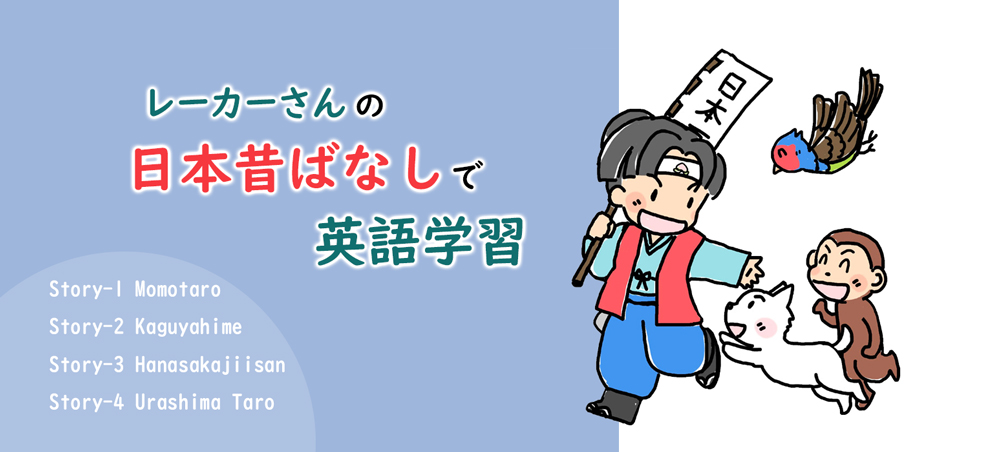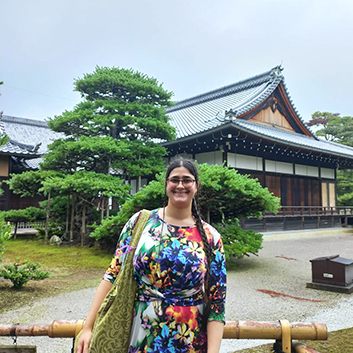
Grammar Rewrites
The Grammar Rewrites are a series of Japanese folk tales, retold in (simple) English with a focus on different grammar aspects. This means that for each grouping of sentences, I chose a specific structure(e.g. to be good at something), which I did my best to use for every sentence to tell the story.
Sometimes this leads to slightly weird sentences, but the purpose of the exercise is to practice the grammar forms in a context that will aid in understanding the sentence and possibly broaden the students’ vocabulary.
[ 説明 ]
”The Grammar Rewrites”は、ワーキングホリデーで日本にやってきたドイツ人のレーカーさんが「まんが日本昔ばなし」を題材にして作った英文法の学習方法です。
学年に適した文法事項を活用して学習できるようにしています。
特定の文法を利用してどのように英文を作ったらよいか、また文で用いられている文法事項はどのような意味を持つのかなどを学習できます。

Hi, I’m Reekha. I’m from Germany and have studied various languages in university. Among them are Japanese and Hindi, as well as Korean and Indonesian.
In my free time I enjoy reading and writing, as well as finding opportunities to practice my language skills.
Recently I have decided to become a full time teacher and I’ve based this decision on a language tutorial I taught in university as well as my experience teaching at Lingua House so far. Teaching is a creative process and the individuality of each student makes it especially fun. There’s no one way to learn a language and finding different ways to match the student is a challenging task but part of the fun.
I hope you can enjoy learning here and that your new language skills open many doors for you. Good luck!
こんにちは、私はレーカーです。ドイツ出身で、大学では様々な言語を学んできました。日本語やヒンディー語、さらには朝鮮語やインドネシア語も学びました。
時間がある時には、読むこと・書くことを通して、自身の言語能力に磨きをかける機会を設けています。
最近になり、本格的に教諭になろうと決めました。この決断は、これまでの大学での指導経験やリンガハウスでの経験に基づいています。教えるということは創造的な過程で、生徒さん一人一人の個性によって、さらにそれは面白くなります。言語を学ぶのに唯一絶対の方法はありません。生徒さんに合うやり方を見つけることは、大変だけれども、楽しいことです。
これを読んでくださっている皆さんが、ここでの学習を楽しみ、身につけた言語能力によって、たくさん新たな扉を開くことを願っています。Good luck!

Hi, I’m Reekha. I’m from Germany and have studied various languages in university. Among them are Japanese and Hindi, as well as Korean and Indonesian.
In my free time I enjoy reading and writing, as well as finding opportunities to practice my language skills.
Recently I have decided to become a full time teacher and I’ve based this decision on a language tutorial I taught in university as well as my experience teaching at Lingua House so far. Teaching is a creative process and the individuality of each student makes it especially fun. There’s no one way to learn a language and finding different ways to match the student is a challenging task but part of the fun.
I hope you can enjoy learning here and that your new language skills open many doors for you. Good luck!
こんにちは、私はレーカーです。ドイツ出身で、大学では様々な言語を学んできました。日本語やヒンディー語、さらには朝鮮語やインドネシア語も学びました。
時間がある時には、読むこと・書くことを通して、自身の言語能力に磨きをかける機会を設けています。
最近になり、本格的に教諭になろうと決めました。この決断は、これまでの大学での指導経験やリンガハウスでの経験に基づいています。教えるということは創造的な過程で、生徒さん一人一人の個性によって、さらにそれは面白くなります。言語を学ぶのに唯一絶対の方法はありません。生徒さんに合うやり方を見つけることは、大変だけれども、楽しいことです。
これを読んでくださっている皆さんが、ここでの学習を楽しみ、身につけた言語能力によって、たくさん新たな扉を開くことを願っています。Good luck!
花咲か爺さん
Hanasakajiisan
Grammar(使用する文法)
- sounds / looks like
- there is
- negation
sounds / looks like
- It looks like a dog is in the rain.
- It looks like an old couple is adopting the dog.
- It looks like the dog is happy.
- It sounds like the dog is barking on the field.
- It looked like the old man dug a hole.
- It looked like there was gold in the hole.
- It sounded like the neighbors wanted the dog.
- It looked like the other couple killed dog.
- The neighbor borrowed the dog.
- There was no gold. There was only rubbish.
- There was an incident.
- There was a dead dog.
- There was a tree on the dog’s grave.
- There was gold in the mortar.
- The neighbor borrowed the mortar. There wasn’t any gold.
- There was a fire and ash.
- The dog and the mortar didn’t exist anymore.
- The old man didn’t collect the ashes.
- The ashes didn’t blow away in the wind.
- Didn’t the dead trees bloom?
Yes, the flowers did bloom. /
Yes, the flowers bloomed. - The daimyo wasn’t very impressed with the blooming flowers.
- The neighbor didn’t lie and say the ashes were his.
- The ashes didn’t fly into the neighbor’s eyes.
- The old man and woman couldn’t leave a happy and rich life.
there is
negation
※In this exercise, all sentences are negated, even if what happened in the story is different.(ここでは、実際の物語の内容と違ってきますが、否定文にしていきます)
Story link
https://www.lingual-ninja.com/folktales/Hanasaka_Jiisan
☆来週は、浦島太郎を用いて疑問文を学びます。